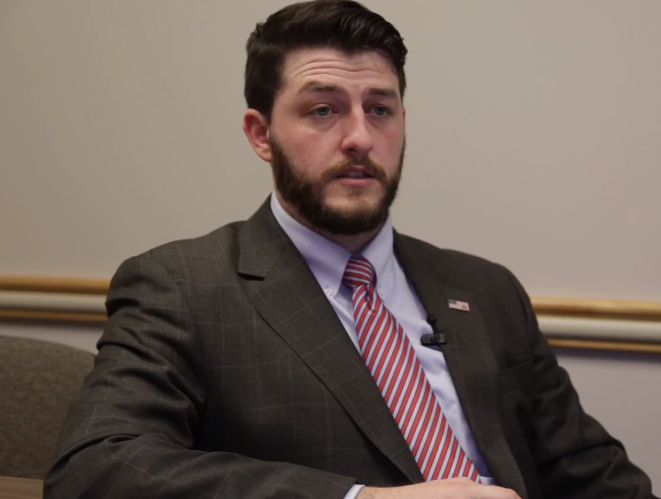URBANA – There is less than a week until the March 19 Illinois Primary. Two Republicans, Joshua Loyd and Thomas Clatterbuck, are running in Illinois’ 13th Congressional District. They hope to advance on March 19 to challenge Democratic incumbent, Rep. Nikki Budzinski in the November general election.
Loyd, 27, describes himself as an entrepreneur. He and his wife run a photography business. He served in the Army before attending the United States Military Academy at West Point, where he earned a degree in business management. He previously worked on the campaign of Rep. Mike Bost, R-Murphysboro. Click here to read a profile of Loyd and Clatterbuck by St. Louis Public Radio reporter Will Bauer,
Loyd spoke with Illinois Public Media politics reporter, David Pierce about the economy, minority history taught in schools and resources to prevent mass shootings. We’ve also embedded a video version of Loyd and Clatterbuck addressing various issues below.
Loyd: We actually have a skill shortage right now. So we need to get more people into these careers. We need to get people into construction, into plumbing, [and] into cosmetology. These vocations, they need workers and they don’t have enough. And they are unemployed. Let’s give them the ability to get that education. It takes only about a year, two years to get that education and they can make $70,000 above the Illinois cost of living standard.
David Pierce: In Illinois, it’s required that schools teach about Black history, Native American history and Asian history. So, do you prefer that the state be this way or that it be more like Florida or Texas, that has banned diversity initiatives in higher education?
Loyd: “I don’t think the issue is with diversity in education. I think it is to the point of trying to help one demographic at the expense of another demographic. As for celebrating history, celebrating one’s uniqueness that is perfectly ok. And I think we definitely should celebrate individual uniqueness in history, and the pursuit of freedom.
DP: Now, you mentioned at the expense of someone else, what did you mean by that?
Loyd: So, if you look at something like Affirmative Action. When you enroll one student over another student, it is taking that opportunity away from that student. And when you’re basing that decision on race, that is not a very good metric by which to make an enrollment decision. Education should be about the mind. It should be something where you are trying to put your full mind and body into your education. Not some standard that you have no control over. People don’t like the term meritocracy, but that’s what education is. And to get into some of these universities, Ivy League or any other university, they have admission standards. And to base it on a criteria should be on how well they can learn, how quickly they can learn and how well they are able to implement that education into the work standard.
DP: When you think about universities that are trying to increase diversity though, and them making sure that they try to admit students based on their race just so that student, that particular demographic has that representation for others to be exposed to, but to also give a universal experience of the nation, the world. Do you think that race should be considered in admissions in that aspect?
Loyd: No, but I do think that where someone comes from should be in the mix. So, if you’re from a community where the average income is below the average mean of the state or the country, that should definitely be taken into consideration. If you’re coming from harder backgrounds than someone who is coming from a very privileged background that should be taken into account. Whereas we’re in the 21st century now and I know there are still some racial tensions. However, we can address that and at the same time, address the economic standards that some people come from.
DP: In the wake of continued mass shootings in the U.S., Josh, can you tell me what legislation would you support if you were elected?
Loyd: So, we have to give service providers more incentive to serve a larger range of people, put mental health in schools and colleges and these areas where people need it. Have you ever heard of the term, ‘going postal’?
DP: Yes.
Loyd: It was because postal workers were working such long hours, so much so that they were going ballistic in the workplace that they were literally ‘going postal’. And unfortunately, negative events happened.

